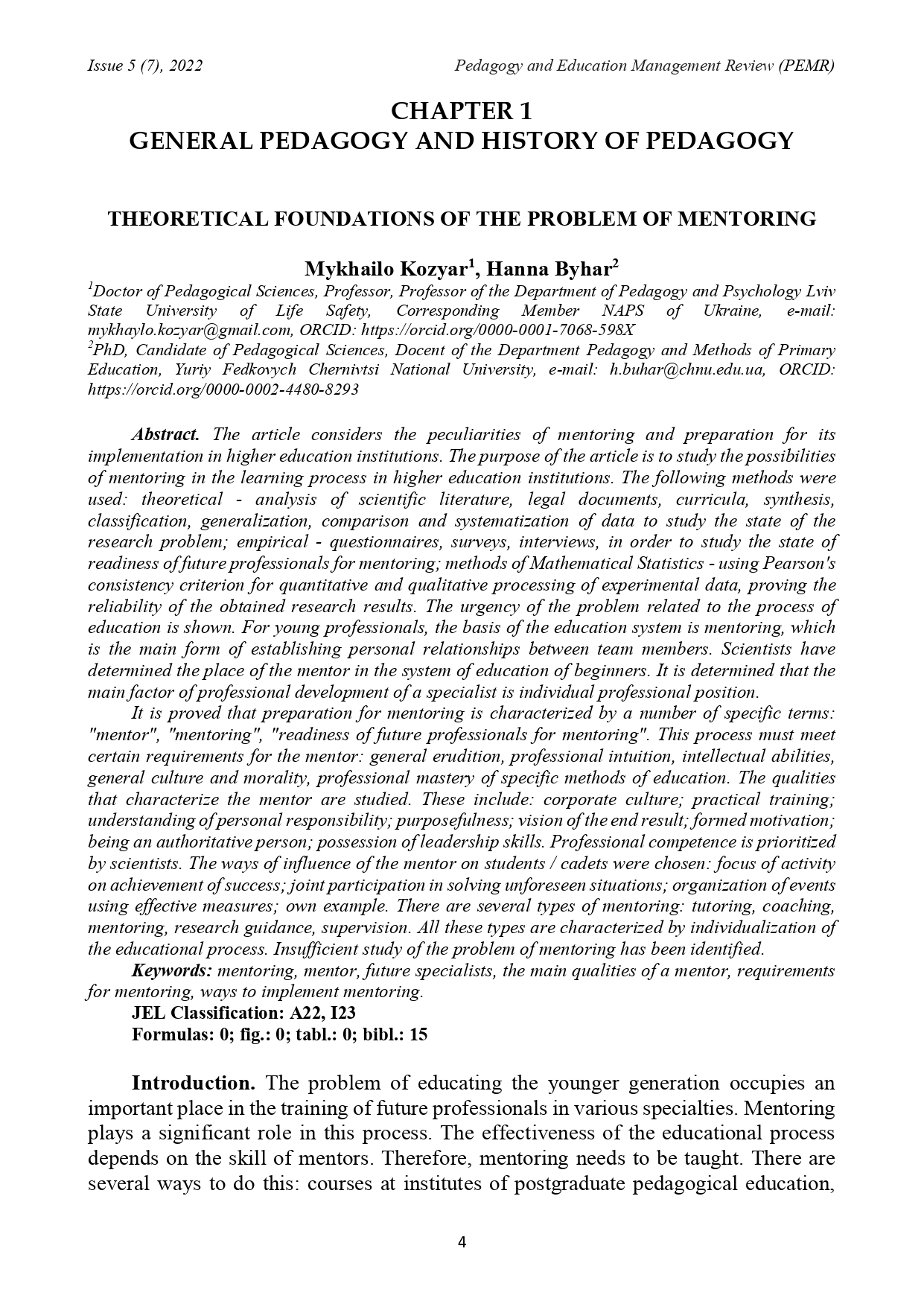Theoretical foundations of the problem of mentoring
DOI:
https://doi.org/10.36690/2733-2039-2022-5-4Keywords:
mentoring, mentor, future specialists, the main qualities of a mentor, requirements for mentoring, ways to implement mentoringAbstract
The article considers the peculiarities of mentoring and preparation for its implementation in higher education institutions. The purpose of the article is to study the possibilities of mentoring in the learning process in higher education institutions. The following methods were used: theoretical - analysis of scientific literature, legal documents, curricula, synthesis, classification, generalization, comparison and systematization of data to study the state of the research problem; empirical - questionnaires, surveys, interviews, in order to study the state of readiness of future professionals for mentoring; methods of Mathematical Statistics - using Pearson's consistency criterion for quantitative and qualitative processing of experimental data, proving the reliability of the obtained research results. The urgency of the problem related to the process of education is shown. For young professionals, the basis of the education system is mentoring, which is the main form of establishing personal relationships between team members. Scientists have determined the place of the mentor in the system of education of beginners. It is determined that the main factor of professional development of a specialist is individual professional position.
It is proved that preparation for mentoring is characterized by a number of specific terms: "mentor", "mentoring", "readiness of future professionals for mentoring". This process must meet certain requirements for the mentor: general erudition, professional intuition, intellectual abilities, general culture and morality, professional mastery of specific methods of education. The qualities that characterize the mentor are studied. These include: corporate culture; practical training; understanding of personal responsibility; purposefulness; vision of the end result; formed motivation; being an authoritative person; possession of leadership skills. Professional competence is prioritized by scientists. The ways of influence of the mentor on students / cadets were chosen: focus of activity on achievement of success; joint participation in solving unforeseen situations; organization of events using effective measures; own example. There are several types of mentoring: tutoring, coaching, mentoring, research guidance, supervision. All these types are characterized by individualization of the educational process. Insufficient study of the problem of mentoring has been identified.
Downloads
References
Tovt S. S. (2009). Social'no-pedahohycheskoe obespechenie professionalnogo stanovleniya kursantov voennogo vuza [Socio-pedagogical support of professional development of cadets of military high school] (Dys. … kand. ped. nauk za specialnostyu 13.00.02). Kostroma, 169 s. [in Russian].
Alyushyna N. O. (2015). Instytut kompetentnisnoho nastavnyctva – odyn iz priorytetiv derzhavnoyi kadrovoii polityky. Visnyk Nacionalnoi akademii derzhavnoho upravlinnia. [The institute of competence mentoring is one of the priorities of the state personnel policy.] http://visnyk.academy.gov.ua/wp-content/uploads/2015/01/2014-4-10.pdf. [in Ukrainian].
Baden M. S., Wilkie K. (2004). Challenging Research in Problem Based New York, USA: Open University Press, 251 p. [in English].
Briggs, William L. Ants, Bikes & Clocks (2005). Problem Solving for Undergraduates / Denver. Colorado: SIAM, 175 pp. [in English].
Morozova M.E. (2016). Nastavnyctvo yak proces formuvannia osobystosti molodogo specialista. [Mentoring as a process of forming the personality of a young specialist.] Naukovyi visnyk UMO. Seriya: Ekonomika ta upravlinnia. 2016. Vyp. 1. http://nbuv.gov.ua/UJRN/nvumo_2016_1_10 [in Ukrainian].
Prytula V. I., Levchenko Z. M. (2013). Systemne nastavnyctvo: upravlinnia korporatyvnymy znanniamy ta navykamy. [System mentoring: managing corporate knowledge and skills.] Visnyk Vinnyczkogo politehnichnogo instytutu, 3, S. 113–118. http://nbuv.gov.ua/UJRN/ vvpi_2013_3_25 (Дата звернення: 12.10.2016). [in Ukrainian].
Alleman E., Cochran J., Doverspike J. & Newman I. (1984). Enriching Mentoring Relationships. The Personnel and Guidance Journal, 62(6). P. 329–332. [in English].
Kruglova Y. V. (2007). Nastavnichestvo kak uslovie professionalnogo stanovleniya [Mentoring as a condition of professional development] (Diss. … kand. ped. nauk za specialnostyu 13.00.08). Mosk. gum. pedagog. institut. Moskva, 178 s. [in Russian].
Heorhiyev V. M. (2014). Rol' nastavnyctva u formuvanni osobystisnyh i profesijnyh yakostei maibutnih oficeriv [The role of mentoring in the formation of personal and professional qualities of future officers of highly mobile airborne troops.] Vysokomobil'nyh desantnyh viis'k. Pedahohika vyshhoyi ta seredn'oii shkoly. Kryvyi Rih, 41. S. 20–24. [in Ukrainian].
Osypova T. Yu. (2016). Teoretyko-metodychni zasady pidgotovky maibutnih vchyteliv do pedagogichnogo nastavnyctva [Theoretical and methodological principles of training future teachers for pedagogical mentoring] (Dys. ... d-ra ped. nauk za specialnistyu 13.00.04). Pivdennoukr. nac. pedag. un-t im. K. D. Ushynskogo. Odesa, 501. [in Ukrainian].
Kovaleva S. M. (2012). Kejs-metod u systemi profesiinoii pidgotovky maibutnih uchyteliv u Velykii Brytaniyi [Case method in the system of professional training of future teachers in the UK] (Dys. ... kand. ped. nauk za specialnistiu 13.00.04). K., 262 s. [in Ukrainian].
Pavlov V. I., Kushniruk O. Yu. (2012). Kouchyng ta nastavnyctvo u pidpryiemnyc`kii diial`nosti Ukrayiny. [Coaching and mentoring in business in Ukraine] Visn. Nacz. un-tu «L`viv. politehnika». # 727. S. 276–279. [in Ukrainian].
Zembyc`ka M. V. (2014). Suchasni formy i vydy nastavnyctva molodyh uchyteliv u SShA. [Modern forms and types of mentoring of young teachers in the United States] Pedagogichna osvita: teoriia i praktyka,17, 43–48. http://nbuv.gov.ua/UJRN/znppo_2014_17_10. [in Ukrainian].
Yarema V. (2018). Kryteriyi, pokaznyky ta rivni gotovnosti maibutnih oficeriv mors`koii pixoty do nastavnyc`koyi diyal`nosti. [Criteria, indicators and levels of readiness of future Marine officers for mentoring] Lyudynoznavchi studiyi: zb. nauk. prac` DDPU imeni Ivana Franka. Seriya «Pedagogika», 6/38, 362–372. doi: 10.24919/2313-2094.6/38.119777. [in Ukrainian].

Downloads
Published
How to Cite
Issue
Section
License
Copyright (c) 2022 “Scientific Center of Innovative Researches” OÜ

This work is licensed under a Creative Commons Attribution-NonCommercial-NoDerivatives 4.0 International License.





